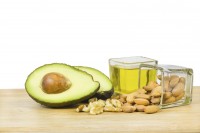I think it’s safe to say that most of us are a bit confused when it comes to ‘good fats’ and ‘bad fats’. Which are which? And why is it important to have good fats in our diets? Let’s start with which is which1,2,5 :
|
2. Fats to have in moderation | 3. Fats to avoid |
| Olive oil | Fatty dairy products: butter, cream, whole milk, cheese | Industrial trans fats/partially hydrogenated fats, found in processed foods such as:
|
| Omega-3 from oily fish (such as mackerel and salmon) and/or fish oil (Choose a good quality fish oil such as ‘Nordic Oil’) | Fatty meats | |
| Nuts (e.g. walnuts, almonds, macadamia nuts, brazil nuts and hazel nuts) | Coconut oil | |
| Seeds | Animal fat (lard) | |
| Avocados | Palm oil | |
| Spinach | Sunflower oil | |
| Broccoli | ||
 But why are some fats ‘good’ and some ‘bad’?
But why are some fats ‘good’ and some ‘bad’?
Fats have become feared since the 1970’s, when they were first blamed for coronary heart disease. However, current research demonstrates that, in fact, sugar and processed carbohydrates are more detrimental to our health and weight and play a much bigger role in causing coronary heart disease than fats do6. Many dieting organisations, and indeed packaging on food, still promote low-fat diets as they purely take into account calories rather than looking at what nutrients our bodies actually NEED.
A deficiency in ‘good fats’ in the body is linked with growth retardation, loss of motor coordination, tingling sensation in the limbs and extremities, visual impairment and behavioural changes4. It is recommended that 20-35% of calories should come from good fats3 which can help with the following2,4:
- Normal growth and development
- Energy production in the body
- Absorption of fat-soluble vitamins (A, D, E and K)
- Maintenance of the structure and function of cell membranes (what is the body made up of? Cells!)
- Improved insulin sensitivity (potentially reducing the risk of type 2 diabetes)
- Reduced systolic blood pressure
- Reduced cholesterol
When it comes to the good fats, there’s a particular one you may be familiar with – omega-3 from oily fish or a good quality supplement. This fat helps combat inflammation and autoimmune disorders and supports the prevention of chronic disorders such as heart disease and arthritis. Adequate omega-3 in the body is essential for homeostasis and proper functioning of the nervous system4.
Too many saturated or trans fats can contribute to increased insulin resistance (a precursor to type 2 diabetes)2 and in women with type 2 diabetes, a diet of increased ‘bad fats’ contributed to a quicker cognitive decline3. This same study3 found that replacing these fats with ‘good’ fats in their diet reduced the rate of cognitive decline in these women. Food for thought, hey?
In summary, do eat the fats in column 1 of our table above – they are essential to your health. Do not fear the fats in the ‘moderation’ column – they can have benefits to our bodies but avoid eating them excessively. The fats that we must avoid are the industrial trans fats or partially hydrogenated fats as these cause a greater imbalance in good and bad cholesterol (and therefore risk of heart disease) than the saturated fats in column 2.
Our advice: eat predominantly whole foods that you have prepared yourself! Ensure you include healthy fats and by avoiding processed foods, you will be avoiding the most unhealthy fats without even trying. Enjoy!
- Expert Panel on Detection, Evaluation, and Treatment of High Blood Cholesterol in Adults (2001). Executive Summary of the Third Report of the National Cholesterol Education Program (NCEP) Expert Panel on Detection, Evaluation, and Treatment of High Blood Cholesterol in Adults (Adult Treatment Panel III). JAMA: The Journal of the American Medical Association, 285(19), pp.2486-2497.
- Zevenbergen, H., de Bree, A., Zeelenberg, M., Laitinen, K., van Duijn, G. and Floter E. (2009). Foods with a High Fat Quality Are Essential for Healthy Diets. Annals of Nutrition and Metabolism, 54(1), pp.15-24.
- DiNicolantonio, JJ. And O’keefe JH. (2017) Good Fats versus Bad Fats: A Comparison of Fatty Acids in the Promotion of Insulin Resistance, Inflammation, and Obesity. Missouri Medicine. 114(4), pp303-307
- Korver, O. and Katan, M. (2006). The Elimination of Trans Fats from Spreads: How Science Helped to Turn an Industry Around. Nutrition Reviews, 64(6), pp.275-279.
- Devore, E., Stampfer, M., Breteler, M., Rosner, B., Hee Kang, J., Okereke, O., Hu, F. and Grodstein, F. (2009). Dietary Fat Intake and Cognitive Decline in Women With Type 2 Diabetes. Diabetes Care, 32(4), pp.635-640.
- Wysoczański, T., Sokoła-Wysoczańska, E., Pękala, J., Lochyński, S., Czyż, K., Bodkowski, R., Herbinger, G., Patkowska-Sokoła, B. and Librowski, T. (2016). Omega-3 Fatty Acids and their Role in Central Nervous System – A Review. Current Medicinal Chemistry, 23(8), pp.816-831.
